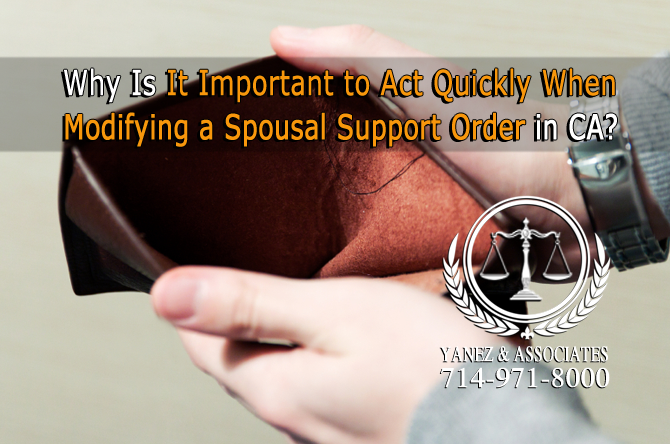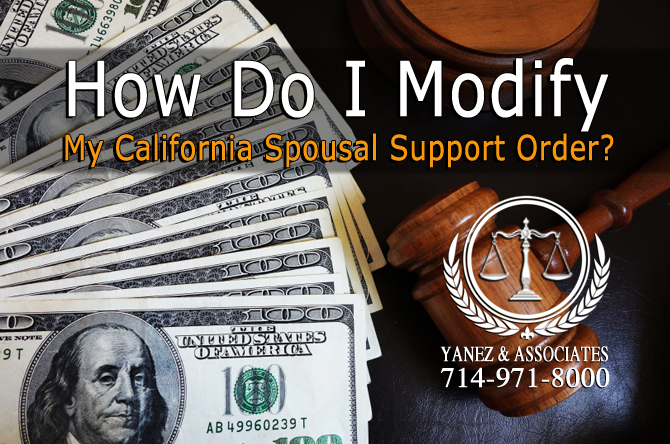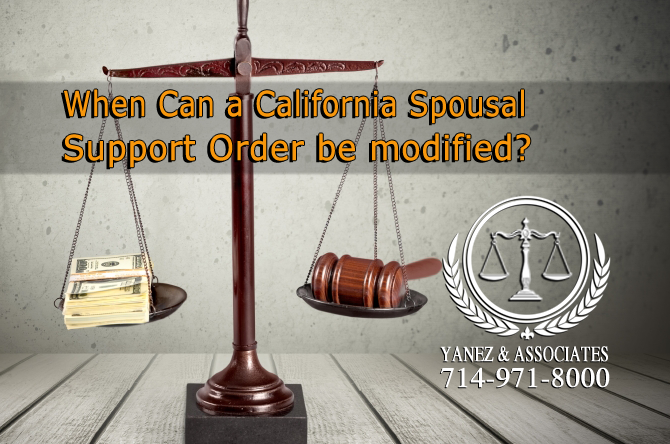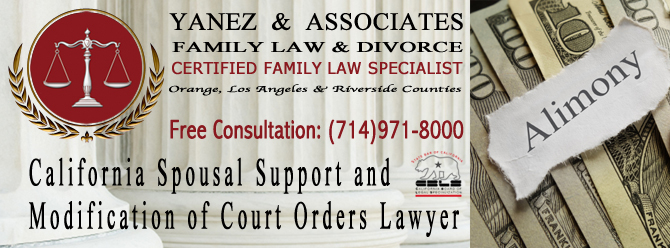Alimony FAQ: My income has reduced and I can no longer pay my Orange County Spousal support!
My income has reduced and I can no longer pay Alimony!
What to Do When You Can No Longer Afford to Pay Spousal Support in Southern California
If you can no longer afford to pay your California spousal support due to loss of income or reduced income, it is critical that you take action as soon as possible. You do have the option to change or modify your spousal support order. In fact, inability to pay spousal support under the existing order is one of the most common reasons that spousal support orders are modified in California.
Consult a skilled California family lawyer who has experience in spousal support and the modification of court orders to help you through your case. Modifying a support order can be tricky, but it does not have to be.
Why Is It Important to Act Quickly When Modifying a Spousal Support Order in California?

Family Law Courts do not act quickly; therefore, the sooner you begin the process, the sooner you will achieve results. All family law cases take their course.
As with any court order, the purpose of having a court order is so that a legal obligation may be enforced by the court system. As long as a valid court order is in place and it can be shown that you were aware of its existence, the court order can be legally enforced.
This means that even if you have recently lost your job or for another reason had a loss in income, the existing court order with your old income information taken into consideration is in effect. Your former spouse or partner can come after you, through the court system, and attempt to make you pay, even if you have had a loss in income.
For this reason, it is important that you take action as soon as you have a loss in income and are aware that you can no longer afford to pay spousal support under the current court order. Loss in income is one of several reasons that a spousal support order can be modified in California.
When Can a California Spousal Support Order be modified?
Spousal support is usually not meant to last forever, so at some point, it will likely need to be modified. While a loss in income on the part of the payer is the most common reason that spousal support orders are modified in California, they may also face modification for other reasons.
If the recipient of the spousal support payments has an increase in income, the recipient may not require as much in spousal support as the current terms of the spousal support order require. However, as the payer of spousal support, it can be difficult to obtain accurate information regarding the income of the recipient, so it can take more effort or require more legal advice in order to change a spousal support order for this reason.
When the receiving spouse either cohabitates with a new partner, or enters a new marriage or registered domestic partnership, the spousal support order may be modified, unless it specifically states in the terms of the order that remarriage is not a reason to modify or terminate the agreement. This is because living with or entering a new legal relationship with a new partner usually decreases the financial burden of the spousal support recipient.
There may be other reasons to modify a spousal support order, especially significant changes in the circumstances of either former spouse or partner. It is always best to discuss your situation with a qualified family lawyer who can explain exactly how the law should be applied to your situation.
How Do I Modify My California Spousal Support Order?

Both my ex and myself have experienced financial changes since our divorce, Now I need to learn, How to Modify My Southern California Spousal Support Order.
Because your existing spousal support order is legally enforceable until a new one has been created and signed by a judge, it is important to have it legally modified in the case that you can no longer afford to pay it. Even if you think that your loss in income is temporary, or you don’t want to deal with the legal process right now, it is always better to act sooner rather than later. You cannot approach a judge later and ask them to retroactively modify your support order in California.
Spousal support is not meant to bankrupt the paying spouse; it is simply meant to allow both spouses to maintain the same standard of living they would have had if they had remained married or in a registered domestic partnership. So, if as the supporting spouse, you can no longer afford spousal support due to a loss in income, the same would have occurred had you still been married or in a registered domestic partnership: you and your spouse would both suffer a loss in income. It is always a good idea to discuss your situation with an attorney and have your court order modified if your circumstances change.
The following is a general guide to asking your local court to modify your spousal support order. It does not in any way replace legal advice that you could get from a qualified attorney, but it can help you understand the process before or during your case.
Court Forms
The first step in starting a spousal support modification case with the court is to find the right forms. Your attorney can help make sure that you have the right ones, you’ll need to make sure that you have all local and state forms, that you have the newest version of these forms, and that they are filled out correctly and completely.
In addition to any local forms your courthouse requires, you should need the following forms.
• Request for Order
• The Information Sheet for Request for Order will give you more information on how to fill out this form correctly and completely.
• Income and Expense Declaration
• Spousal or Partner Support Declaration Attachment - This form may or may not be necessary, depending on how much information you wish to give the judge. In most cases, it is beneficial to use this form.
• Declaration, or Attached Declaration - This form is also optional, but will provide you additional room to explain your case to the judge.
It is in your best interests to have an attorney look over your forms prior to submitting them, because once they are filed, you cannot edit them. A skilled lawyer can help you make sure that the forms are filled out completely and accurately, and that you are not missing information that could potentially help your case.
Filing Paperwork and Getting a Court Date
Before you file your forms, you will need to make copies for everyone involved, because the court will keep the original. That means you will need at least one copy for you and one for your former spouse or partner.
To file your forms, take them to the court clerk, who will mark them as filed and collect the filing fee from you. The clerk will also assign you a court date, which will be put on your form and the copies.
Service of Process
Your former spouse or partner has a right to be aware of any pending case against him or her. Therefore, it is your responsibility to serve the papers regarding the upcoming modification of a spousal support order hearing on your former spouse or partner.
In addition to your Request for Order and any additional forms that you filed, you should include a blank Responsive Declaration to Request for Order, and a blank Income and Expense Declaration for your former spouse or partner to fill out.
These forms must be served on your former spouse or partner at least 16 days before your court date, and sometimes even earlier. Your attorney can help you make sure that you serve your papers in time.
Remember that you cannot personally serve these papers on your former spouse or partner. In some cases, you may be able to serve them through certified mail; in other cases you may need to have them served in person. The person who serves the forms cannot be involved in your case. In the case of spousal support modification, this means it cannot be you or your former spouse or partner. The process server must also be at least 18 years old - professional process servers exist for this reason.
Once your forms have been served on the other party, you need to make sure that a proof of service is filed with the court. Depending on how the papers were served, you will need a different form to do this. It is very important that the proof of service is filed correctly - have an attorney help you with this if you need it.
The Hearing
Make sure that you attend your hearing. Take a copy of all of your court documents, including the proof of service, with you to the hearing. Your attorney can help you prepare.
The judge will make his or her decision at the hearing - so you will find out whether or not your order will be modified to fit your new situation.
Finishing Up Your Case
You may or may not need to take care of more paperwork following your hearing - it depends on where you file. Ask your attorney if you have further action to take so that your new order is effective.
Keep a copy of your court order on hand in case you need to enforce it in the future.
California Spousal Support and Modification of Court Orders Lawyer
If you are facing a loss in income and can no longer afford your spousal support payments, contact the attorneys at Yanez & Associates as soon as possible to schedule your free initial consultation. Remember - the faster you act when it comes to spousal support modification, the better off you will be.














